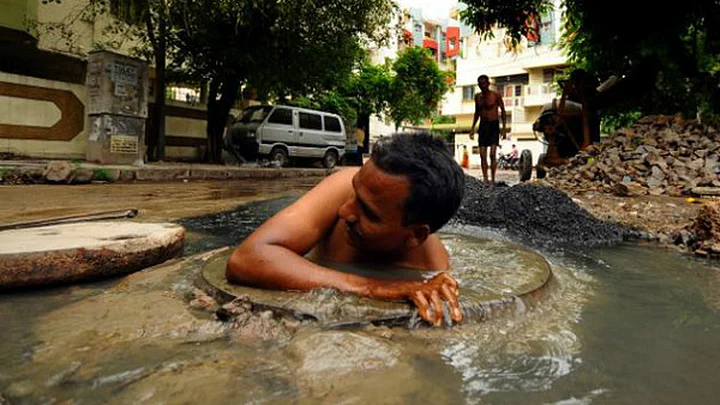“I was admitted to the Nizamabad government hospital and my new-born daughter was just 6 days old, when I heard the news about my brother’s death. My brother was 25 years old and the news shook me. In spite of severe pain due to the C-section, I pushed myself so that I could see my brother’s body on the third floor,” said a disconsolate 22-year-old Israth, whose brother died while cleaning a septic tank.
I got married a year back, my brother took a loan of Rs 50,000 for my marriage preparations. He was more like a father to me as we lost our father years back. But now we are unable to repay the loan of Rs 50,000 which my brother took for my marriage as we don’t have any breadwinner left in the family.Israth, sister of sanitation worker
Israth is not the first one to have lost a family member to the unhygienic and dangerous job.
Many heartbroken family members of safai workers who died while cleaning manholes and septic tanks were present at the Safai Karmachari Andolan (SKA) which was conducted at Indira Park in Hyderabad on Wednesday.
Dignity of Work
Safai Karamchari Andolan (SKA) has been conducting a countrywide campaign for the eradication of manual scavenging. Two years ago, SKA’s Parivartan Yatra conducted a tour throughout the country, which culminated in Delhi. Now, this campaign has been extended to cover the issues of sewerage workers, who are all casual labourers, and are forced to clean manholes and blocked drains without any protective gear.
They are usually hired when someone has to physically get into a drain to clean it. Many workers have lost their lives and their families haven’t been compensated despite the provision of compensation in the law.
In a significant endorsement of concerns raised by the Safai Karmachari Andolan, the Supreme Court directed the government to, “Identify the families of all persons who have died in sewerage work (manholes, septic tanks) since 1993 and award compensation of Rs 10 lakh for each such death to the family members depending on them”.
In its judgment by a Supreme Court Bench headed by Chief Justice P Sathasivam, the court categorically said that if the practice of manual scavenging has to be brought to a close and also to prevent future generations from the inhuman practice of manual scavenging, rehabilitation of manual scavengers will need to be carried out.
We are conducting a Bhim yatra to stop this killing because safai karmacharis of this country have passed many generations and we are dying in sewerage lines and septic tanks and the government doesn’t even have any data about them. The Supreme Court passed a judgment giving a compensation of Rs 10 lakhs for families of people who died due to manual scavenging since 1993, but we are not here to die and get compensation. We also have a right to survive and we are not going to rest until the last manual scavenger is liberated and rehabilitated with a dignified profession.Bezwada Wilson, national convener of Safai Karmachari Andolan, to The News Minute
No Adequate Compensation
Thirty-year-old Shakuntala from Adilabad who lost her husband in July 2008, told TNM, “My husband Raju died when he was 22 years old, while cleaning a septic tank. He used to earn around Rs 400 per day, which was obviously not sufficient for our family needs but after my husband’s death we lost everything. No one should ever suffer like this the way we are suffering and like many others who lost their family members. The government should help us”.
They offered me the same job after my husband’s death but that time my kids were very young so I couldn’t take up the job, and I was also a little scared to do the same work through which I had already lost my husband. My kids used to go to school when they were young but after their father’s death, I am not able to educate them due to financial problems.Shakuntala, wife of sanitation worker
M A Shakeel, a 50-year-old advocate told TNM, “Most of them are working on daily wages and many of them are losing their lives but still no compensation has been given to the families even after the judgement of the Supreme Court. Whenever people look for safai karamcharis, they generally look for people from SC/ST community, which shows the clear discrimination of caste and exploitation of people from schedule castes.
There has to be a change in the mechanisms, there should be a liberation, there should not be any caste discrimination that only SC/ST people should work.M A Shakeel, advocate
The Safai Karamchari Andolan declared that if the government fails to respond to their appeals, it would call for drastic action from the safai workers.
(The writer Anusha Puppala works with The News Minute.)
(At The Quint, we question everything. Play an active role in shaping our journalism by becoming a member today.)
